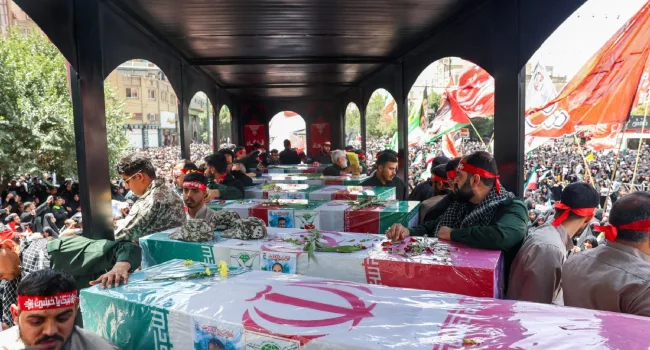Iran began a state funeral on Saturday for around 60 people, including top military commanders killed during its recent conflict with Israel, as Tehran’s top diplomat denounced former US President Donald Trump’s comments about Supreme Leader Ali Khamenei as “unacceptable.”
The ceremony commenced at 8:00 a.m. local time in Tehran, with government offices and many businesses closed in observance. State TV showed mourners dressed in black, waving Iranian flags and holding portraits of the fallen commanders.
Iranian President Masoud Pezeshkian and other senior officials attended the event, which featured coffins draped in Iranian flags near Enghelab Square in central Tehran.
The funeral follows a 12-day conflict launched on June 13, marked by US strikes on three Iranian nuclear sites in support of Israeli attacks on Iran’s nuclear program. Both Israel and Iran claimed victory after a ceasefire was reached. Iranian leader Khamenei downplayed the US strikes, saying they caused “nothing significant.”
On Friday, Trump criticized Iran’s claims of victory on his Truth Social platform. He boasted about sparing Khamenei’s life, claiming he knew “exactly where he was sheltered” and prevented his assassination by Israeli or US forces. Trump also revealed he had been working on lifting sanctions on Iran but abandoned those efforts after Iran’s negative response.
Iranian Foreign Minister Abbas Araghchi responded sharply on social media, urging Trump to “put aside the disrespectful and unacceptable tone towards Iran’s Supreme Leader” if he genuinely wanted a deal. Araghchi praised the Iranian people for forcing Israel to seek US help “to avoid being flattened by our missiles.”
According to Tehran’s health ministry, Israeli strikes killed at least 627 civilians in Iran, while Iranian attacks on Israel killed 28, according to Israeli sources.
‘Historic’ funeral ceremony
The funeral procession will continue to Azadi Square, about 11 kilometers away. Mohsen Mahmoudi, head of Tehran’s Islamic Development Coordination Council, called the day “historic for Islamic Iran and the revolution.”
Among the deceased is Major General Mohammad Bagheri, deputy commander of Iran’s Revolutionary Guards, who will be buried alongside his wife and daughter, a journalist also killed in the attacks. Nuclear scientist Mohammad Mehdi Tehranchi and Revolutionary Guards commander Hossein Salami, killed on the war’s first day, will also be laid to rest, alongside at least 30 other senior commanders. Four children are among the 60 buried.
Rising tensions and nuclear concerns
Trump had withdrawn the US from the 2015 nuclear deal in 2018, which sought to limit Iran’s nuclear capabilities while allowing civilian use. Since then, Iran accelerated its nuclear activities.
Following the recent strikes, Trump announced plans for new negotiations, but Tehran denied any talks. Khamenei dismissed US claims that Iran’s nuclear program was severely damaged.
Israel asserted it thwarted Iran’s nuclear ambitions during the conflict. Israeli Foreign Minister Gideon Saar warned the international community must act to prevent Iran from acquiring a nuclear weapon, calling Tehran “the world’s most extreme regime.”
AFP


